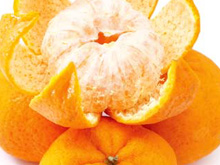 |
Nature is very kind – when it gives us intense heat in the summer month of May, it also gives us some great water-rich fruits and vegetables like cucumber, lettuce, spinach, spring onions, carrots, radishes, lemons and oranges. Oranges are thought to have their origin in a sour fruit growing wild in the region of South West China and North East India as early as 2,500 BC. |
Today, orange is cultivated in almost all the warm countries of the world. The word orange comes from the Sanskrit narangi, meaning the colour orange.
Its consumption is as popular in the raw, peeled form, as in the juice form. Even the rind of orange is used in recipes, either for flavouring or for garnishing purposes. Being a rich source of nutrients, orange has been associated with a number of health and nutrition benefits.
Being rich in vitamin C, consumption of oranges has been found to result in an increase in resistance towards infections like cough and cold.
- Oranges are also beneficial in maintaining dental health, because of the vitamin C and calcium present in them.
- Being rich in calcium, oranges have been associated with protection and maintenance of the health of bones.
- Beta-carotene, a nutrient present in oranges, is a very powerful antioxidant that protects our cells from damage.
- Oranges have been associated with keeping blood pressure under check, mainly owing to the presence of magnesium.
- Oranges, being rich in vitamin B6, help support the production of hemoglobin in the body.
- Regular consumption of orange juice can significantly increase HDL levels and improve the LDL-HDL ratio.
- The folic acid present in oranges helps in proper brain development.
- The high content of potassium in oranges helps maintain electrolyte balance in the cells and also aids the maintenance of a healthy cardiovascular system.
Consumption of oranges can help an individual in dealing with the following ailments: arthritis, bronchitis, constipation, fever, heart diseases, indigestion, influenza, measles, pimples and acne, pneumonia, pyorrhea, respiratory problems, rheumatism, tuberculosis and typhoid.
The only downside of eating an orange is that when its pith or juice is exposed to air, the vitamin C content depletes fairly rapidly. So drink the juice as soon as you squeeze it!
Very high in moisture content, orange is the perfect fruit to hydrate oneself with, this summer!
|
What’s in season in May?
Vegetables
Broad beans, broccoli, carrots, cauliflower, cucumber, kohlrabi, lettuce & salad leaves, new potatoes, onions, peas, radishes, spinach, spring onions
Fruits
Apricots, bananas, cherries, kiwi fruit, lemons, oranges |
|
|